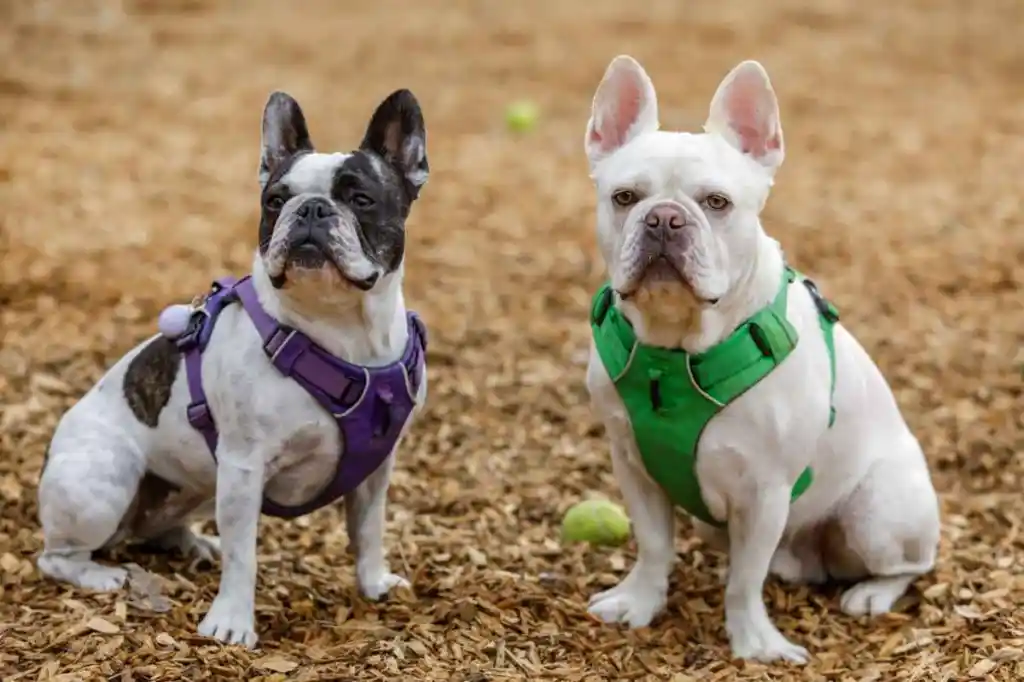The Frenchton is a small-to-medium-sized cross between the Boston Terrier and French Bulldog, two breeds known for their compact size and sociable demeanor. Sturdy, playful, and easygoing, these pups inherited some of the best qualities from both of their parents. Frenchtons also go by the names Frenchbo, Faux Frenchbo, and Froston. Despite their status as a designer breed, you can find these pups, in shelters and breed-specific rescues. Always prioritize adoption if you’re considering bringing a Frenchton puppy home.
Frenchtons are highly adaptable, making them ideal pets for urban dwellers, relaxed individuals, or active families. They’re excellent travel companions and are happy to join their families on any adventure. Known for their sweet nature, Frenchtons are great with children of all ages. With plenty of affection and some activity, they can thrive even in small apartments. However, they may not be the best fit if you work long hours and can’t spend much time with them. On the other hand, if your workplace welcomes dogs, this easygoing breed would happily accompany you and enjoy being by your side.
Frenchton characteristics
- Height: 11 to 14 inches at the shoulder
- Weight: 15 to 25 pounds
- Lifespan: 12 to 15 years
Coat and color variations
Frenchtons typically have a short, smooth coat that is low-maintenance and soft to the touch. Their coat colors vary widely and include black, white, brindle, fawn, cream, and pied (a mix of white with patches of another color). Some Frenchtons may also inherit the Boston Terrier’s classic tuxedo markings, while others might resemble the solid or slightly merled patterns of a French Bulldog.

Frenchton physical features
Size and build
- Size: Small to medium; typically 13–16 inches tall and weighing 15–25 pounds.
- Build: Compact, muscular, and stocky body with a solid and balanced structure.
Facial features
- Ears: Perky, bat-like ears that are a hallmark of the breed.
- Face: Short, flat muzzle with a slightly upturned nose; less pronounced than the French Bulldog.
- Eyes: Large, round, and expressive, often reflecting their playful and affectionate nature.
- Skin: May have slight facial wrinkles, especially around the nose and forehead, adding to their character.
Coat colors and texture
- Coat: Short, smooth, and low-shedding; easy to groom.
- Colors: Wide variety, including black, brindle, fawn, white, pied, and cream, often with unique markings.
Other physical attributes
- Tail: Naturally short and can be straight or slightly curled.
- Paws: Small and rounded, often set slightly outward, giving a sturdy stance.
- Legs: Short but strong and well-proportioned, providing agility despite their compact size.
- Back: Straight and level, with a slightly compact, square-shaped frame.

How big does a Frenchton puppy get?
A Frenchton puppy will grow into a small to medium-sized dog, typically reaching their full size by 12–18 months of age. Adult Frenchtons generally stand 13–16 inches tall at the shoulder and weigh between 15–25 pounds, depending on factors such as genetics, diet, and exercise.
Their size can vary slightly depending on whether they take more after the French Bulldog (more compact and stocky) or the Boston Terrier (slightly leaner and taller). Even as puppies, Frenchtons are known for their sturdy build, making them feel solid and robust despite their smaller size.
Frenchton personality
Frenchtons are affectionate, friendly, and adaptable dogs with a cheerful and playful demeanor. They thrive on companionship and are known for their loyal nature, making them excellent family pets. These dogs love to entertain and are often comical, bringing joy to their owners with their silly antics. Despite their playful energy, they are also laid-back and enjoy lounging with their family. Frenchtons are highly social and form strong bonds with their humans, but they can also be independent enough to relax on their own for short periods. Their intelligence and eagerness to please make them easy to train, though a gentle approach works best due to their sensitive nature.
Behavior and temperament
- Affectionate: Strongly bonded to their families; love cuddles and attention.
- Playful: Enjoy games and interactive activities; great for kids.
- Social: Friendly with strangers and other pets when well-socialized.
- Adaptable: Thrive in various living environments, from apartments to houses.
- Comical: Known for their entertaining antics and cheerful spirit.
- Loyal: Protective and devoted to their loved ones.
- Mildly Energetic: Active enough for playtime but enjoy downtime too.
- Intelligent: Quick learners, though they may have a hint of stubbornness.
- Quiet: Not overly vocal; tend to bark only when necessary.
- Sensitive: Respond well to positive reinforcement and gentle training methods.

Training and socialization
Early socialization and positive reinforcement training are crucial due to their intelligence and potential stubbornness. Of course, their intelligence allows them to pick up commands quickly, so early training is key to establishing good behavior from the start. Use praise, treats, and affection to reward desired behavior. Frenchton dogs respond well to positive reinforcement, and this approach will keep them motivated and engaged.
Training tips:
- Be Consistent: Consistency is crucial in training. Use the same commands and routines to avoid confusion. This helps your Frenchton understand what is expected of them.
- Keep Training Sessions Short and Fun: Although Bulldog Boston Terrier mixes are intelligent, they can lose interest if training sessions are too long or repetitive. Keep sessions short (10-15 minutes) and engaging with varied activities.
- Mental Stimulation: Incorporate puzzle toys, obedience training, and interactive games into their routine to challenge their mind. A bored Frenchton can become restless. Once basic obedience is established, teach more advanced commands or tricks.
Frenchton care
As with all dogs, it’s important to keep up your Frenchton’s regular veterinary checkups to detect any health concerns early. Your vet can help you develop a care routine that will keep your dog healthy.
How much exercise does the Frenchton need?
A couple of daily walks, totaling 30–45 minutes, are usually enough to keep your Frenchton happy and healthy. While Frenchtons aren’t known for their athleticism or high energy levels, they still need regular exercise to stay fit and stimulated. Be mindful not to overdo it, especially in hot weather, as Frenchtons are a brachycephalic breed and can struggle with overheating or breathing difficulties during vigorous activity.

Frenchton grooming needs
Frenchtons have low-maintenance grooming requirements due to their short, smooth coat. They are moderate shedders, so regular brushing helps keep their coat healthy and minimizes loose hair around the home. Their facial wrinkles, if present, need gentle cleaning to prevent irritation or infection. Additionally, their ears, teeth, and nails require consistent care to ensure overall health and hygiene.
How to groom a Frenchton
- Brushing: Use a soft-bristle or rubber brush 1–2 times a week to remove loose fur and keep the coat shiny.
- Bathing: Bathe every 4–6 weeks or as needed using a mild dog shampoo to avoid skin irritation.
- Wrinkle Care: Gently clean facial wrinkles with a damp cloth or pet-safe wipe, and dry thoroughly to prevent moisture buildup.
- Ear Cleaning: Check ears weekly and clean with a vet-recommended ear cleaner to avoid wax buildup or infection.
- Nail Trimming: Trim nails every 3–4 weeks or when you hear them clicking on the floor to prevent overgrowth.
- Dental Care: Brush teeth 2–3 times a week with dog-friendly toothpaste to reduce plaque and maintain oral health.
- Eye Care: Wipe around their eyes if discharge is present, using a soft cloth or pet-safe wipe.
Feeding and nutrition
An ideal Frenchton diet should be tailored to a small to medium-sized breed with moderate energy levels. Since Frenchtons can be prone to obesity due to their compact build and love for treats, portion control is essential to prevent weight-related health issues, such as joint strain or respiratory complications. Pairing a balanced diet with regular exercise is crucial for maintaining their overall health and ideal weight.
Opt for a high-quality dog food that lists real meat as the first ingredient and includes wholesome grains, fruits, and vegetables. The food should offer a balanced blend of protein, healthy fats, and carbohydrates. Protein supports muscle development, while fats contribute to a healthy coat, skin, and energy levels. Avoid foods with artificial additives, preservatives, or fillers like corn or soy, which provide little nutritional value.
- Meal Size: Frenchtons typically require 1 to 1.5 cups of high-quality dry dog food daily, adjusted based on age, weight, and activity level.
- Feeding Frequency: Divide their daily food into two meals—one in the morning and one in the evening—to prevent overeating and aid digestion.
- Treats: Use healthy, low-calorie treats in moderation to avoid unnecessary weight gain.
Frenchton family compatibility
Frenchtons are excellent family companions thanks to their affectionate and social nature. They form strong bonds with their human family members and thrive in homes where they receive plenty of attention and love. Their playful and gentle demeanor makes them great with children, as they enjoy interactive games and can match the energy of younger family members without being overly boisterous. Frenchtons are also tolerant and friendly with other pets when properly introduced, making them a wonderful addition to multi-pet households.
Their adaptability allows Frenchtons to fit well into various family lifestyles, whether in a bustling house or a quieter home environment. They are content lounging around with family members or joining in on adventures, making them suitable for both active families and those who prefer a more laid-back routine. While they don’t require excessive exercise, they do need regular walks and playtime to stay happy and healthy. Frenchtons are happiest when they’re included in family activities and thrive on being part of the daily routine.

Potential health issues
Frenchtons, like their French Bulldog and Boston Terrier ancestors, may inherit certain health issues. While many Frenchtons are generally healthy, they can be predisposed to specific conditions including:
- Eye Problems: Conditions like cherry eye, cataracts, or corneal ulcers can affect Frenchtons, leading to discomfort or vision impairment. Regular eye checks help catch and treat these issues early.
- Digestive Issues: Frenchtons can experience food sensitivities or indigestion, which may lead to bloating, diarrhea, or vomiting. Feeding them a high-quality, well-balanced diet can minimize these problems.
- Respiratory Problems: As a brachycephalic breed, Frenchtons may have shortened airways, making them prone to breathing difficulties, especially in hot weather or during strenuous activity.
- Breathing Issues: Stenotic nares (narrow nostrils) and an elongated soft palate can contribute to noisy breathing or snoring and, in severe cases, require surgical intervention to improve airflow.
Frenchton rescue groups
It may be hard to find a breed-specific rescue for Frenchtons because they are a mixed designer breed. However, you may want to try French Bulldog or Boston Terrier breed-specific rescues, as they often care for mixes, as well. Here are some rescues you can try:
If you choose to buy a Frenchton puppy, finding a reputable dog breeder is crucial. Reputable breeders are committed to breeding healthy, well-socialized puppies that will make great companions. They will screen their breeding stock for health problems, socialize their puppies from a young age, and provide you with lifetime support.
How much are Frenchton puppies?
A Frenchton puppy can cost anywhere from $2,000 to over $5,500, depending on factors such as the breeder, color, location, and parentage. While you may find Frenchton puppies at a lower price, be cautious, as this could indicate an untrustworthy breeder who is prioritizing quick profits over the well-being of the puppies. Always do your research to ensure that you’re not only bringing home a healthy puppy but also avoiding supporting inhumane breeding practices or animal cruelty.











